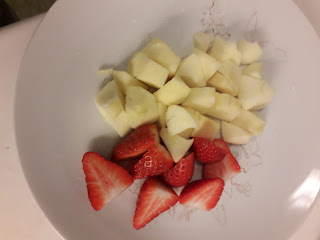 |
| Avocado and egg yolk puree |
Many children in Nigeria do not meet the recommended daily intake of fruits and vegetables. It is more common to offer children energy-dense, low nutrient foods which are linked to either obesity or other forms of malnutrition.
Offering your child good and balanced foods is very important for your child's growth and development especially in the first 1000 days of your child's life.
Among healthy foods you could offer your child of 6 months and above is avocado and egg yolk puree. Children below the age of one are not known to properly digest egg whites so it is recommended that they are offered the yolk alone. Egg yolks have a soft texture that make them suitable for infants.
A research conducted by Maria M et al... and published in The American Journal of Clinical Nutrition (2002) 75: 6,1084–1092 revealed that the addition of egg yolk to the diet of infants resulted to modest improvements in their dietary iron status. Considering that from 6 months of age, babies need more dietary iron than breast milk supplies make dietary sources of iron beneficial to babies. Little wonder Laura L et al in Nutrition Reviews 2014, 72: 6, 355–368 described eggs as having an "uncracked potential for improving maternal and child nutrition........".
Avocado has been described by nutritionists as "a great first food for babies". Avocado is a great nutrient-dense food full of healthy monounsaturated fats and nearly 20 minerals and vitamins. Its texture and creaminess makes it acceptable to many babies. Avocado can be mashed/pureed with different fruits to make wonderful baby foods.
Ingredients
- A ripe but firm blemish-free avocado
- 2 yolks (or more) from a hard-boiled egg
Procedure for preparing avocado and egg yolk puree
- Wash the avocado, cut it into two parts and use a spoon to scoop out the flesh
- Put avocado flesh and egg yolks into a blender and blend with a little water to get the consistency you think is suitable for your baby's age. For babies who have started eating textured or lumpy foods, the food can just be mashed and not pureed.
 |
| Ripe avocado |
 |
| Yolks of hard-boiled chicken eggs |
 |
| Avocado and egg yolk puree |















































